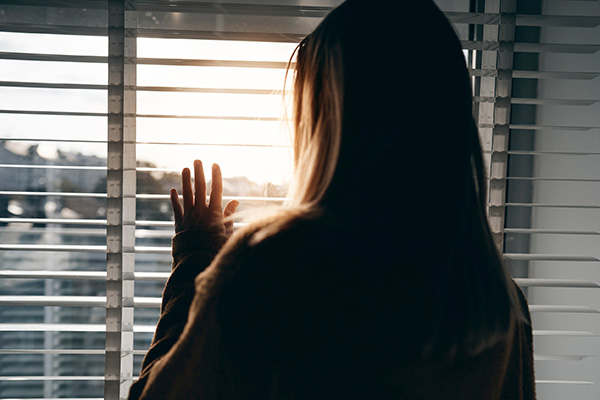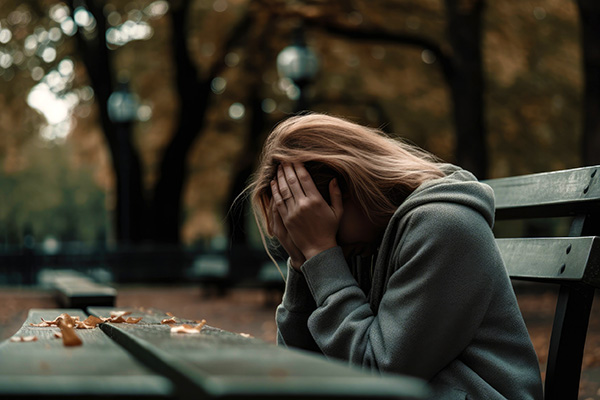depression
When Life Gets Hectic Find Your Way Back To Source
 Whether it manifests in your body, feelings, or spiritual well-being, stress can really knock you off balance. Many of us are all too familiar with this. It sneaks in slowly, or rushes in like a storm. Suddenly, you’re exhausted, scattered, anxious, or just not feeling like yourself.
Whether it manifests in your body, feelings, or spiritual well-being, stress can really knock you off balance. Many of us are all too familiar with this. It sneaks in slowly, or rushes in like a storm. Suddenly, you’re exhausted, scattered, anxious, or just not feeling like yourself.
When this happens, it’s as if your inner compass has been thrown off. You forget what it feels like to be centered, calm, and connected. Fortunately, there’s a beautiful and simple way back to your “true north”: meditation.
Meditation is one of those practices that has stood the test of time for a reason. It doesn’t just help us handle stress better. It helps raise our energy and bring us back into balance.
And beyond that, it can offer us something truly magical: a direct experience of our connection to the unified field of intelligence. Some people call it the void. Others call it the Source, Spirit, or simply Presence. No matter what you call it, it’s that vast, peaceful space that holds everything together, and we’re already a part of it.
I’ve personally felt the difference meditation makes in my life. But I’ll be honest: these past few weeks have been a whirlwind. So much has been going on, and in the chaos, I missed my daily meditations. And wow, did I feel it.
When I don’t take the time to realign, everything feels just a little harder. Meditation helps me feel whole. It’s like a reset button for my body, mind, and spirit. Especially with the kind of energy work and spiritual focus I need in my daily life, I rely on it to keep me grounded and in tune.
The Empath’s Guide To Toxic Friendships
 Our friends are a beautiful and enriching part of our lives. In some cases, they even become our chosen family through the bonds of mutual caring and shared life experiences.
Our friends are a beautiful and enriching part of our lives. In some cases, they even become our chosen family through the bonds of mutual caring and shared life experiences.
Healthy friendships are built on a foundation of balance. They’re marked by mutual support, trust, loyalty, acceptance, and honesty, all with a touch of compassion. But for the empath or highly sensitive person, friendships can sometimes be a bit of a rollercoaster.
We might feel like we’re always giving and giving, and sometimes we might even feel drained. It can be hard to know when to draw the line with someone who might be taking advantage of our energy.
Friendships can be so many different things, and it’s important to remember that not all of them are the same. They range from casual acquaintances to deep, intimate bonds we form with those we call our “besties.”
It’s so important to have a close friend you can trust with your most private fears, dreams, and vulnerabilities. But, sadly, this isn’t always the reality. If you’re the kind of person who is sensitive to the feelings of others, you know how hard it can be when you’re betrayed or disappointed by someone close to you. It can feel like the saying “keep your enemies close” is true in these situations.
Some of us are more outgoing and have a large social circle, while others are more introverted and have a small social circle. Empaths can fall into either category. Regardless of which category an empath falls into, it is wise for us to exercise discernment.
Tell-Tale Signs You Are Being Gaslighted
 You’re crazy, that never happened. Don’t be so sensitive. I’ve never had this problem with anyone else but you. It was never my idea, it was yours! Come on, you’re imagining things. Everyone else agrees, except you. You’re just making things up.
You’re crazy, that never happened. Don’t be so sensitive. I’ve never had this problem with anyone else but you. It was never my idea, it was yours! Come on, you’re imagining things. Everyone else agrees, except you. You’re just making things up.
These are just some of the things you might hear when someone is gaslighting you. It usually happens whenever you confront them about their bad behavior, only to have your reality twisted in return…in ways that can really make your head spin!
Gaslighting is a form of psychological abuse that most often shows up in toxic romantic relationships, but it can also manifest in dynamics with friends, coworkers, employers, family members, and even neighbors and landlords.
At its core, gaslighting is the manipulation of your sense of reality, leaving you confused, anxious, and doubting yourself and your own perceptions. Sometimes it’s very obvious and unmistakable. Other times, it happens so subtly you may not even realize you’re being manipulated.
The term “gaslighting” comes from the 1938 stage play Gas Light, which was later made into the 1944 film of the same name.
In the story, a husband tricks his wealthy wife into thinking she’s going crazy by making small changes to their surroundings, like dimming the gas lights, and then denying that anything has changed. His goal is to make her doubt her own sanity, so he could have her committed to a mental institution and gain control of her inheritance.
Honoring Yourself In Difficult Family Relationships
 Family dynamics can be tremendously complex for many of us. These relationships are multilayered and deeply ingrained, often playing out across generations.
Family dynamics can be tremendously complex for many of us. These relationships are multilayered and deeply ingrained, often playing out across generations.
Many of my clients seek psychic insight about family matters. After matters of love and romance, and then business or career, family is often the most emotionally charged subject.
In readings, especially with empaths, intuitives, and highly sensitive individuals, I hear countless stories of family pain. Many carry a sense of never belonging, of being misunderstood or scapegoated.
These emotional burdens are often the heaviest that people bear because they are tied to the people they loved first and still love, despite the hurt.
When control or finances are interwoven into the family structure, the complexity of these relationships multiplies.
For many, family represents a love-hate relationship or a deep bond that carries deep wounds. While we cannot choose our family, we do have a say in how we interact with them, how we respond, and whether we continue to engage.
Severing family ties is a significant and often heartbreaking decision that is never taken lightly. By the time someone considers taking this step, the drama or emotional abuse has often been ongoing for decades and is sometimes rooted in a vividly painful childhood.
Are You Holding On To The Wrong Person?
 Many of the questions that callers ask me during readings have one thing in common: how another person is affecting the their health, happiness, and peace of mind.
Many of the questions that callers ask me during readings have one thing in common: how another person is affecting the their health, happiness, and peace of mind.
Despite the differences in the details, the underlying story is often the same: the person’s inner light is dimmed because they have been giving too much power to another person’s choices, moods, or shortcomings.
Many people seem to be in the wrong relationships. They hold on, waiting for things to change and hoping for the best. They postpone plans, silence their own needs and preferences, and test the limits of their patience, believing that a breakthrough will come tomorrow.
However, that is usually not what happens. People do not change for another person, and if they do, it never lasts or works out in the long run. A change driven by the need to please someone else rarely survives the stress of real life. As soon as complications arise, old habits resurface. People can only change for themselves.
Spirit’s guidance on this is always very clear: hanging onto the wrong person — whether a friend, family member, spouse, partner, lover, or boss — prevents us from experiencing the best life has to offer.
When we’re busy monitoring someone else’s actions, we have less capacity for our own personal and spiritual growth. This prevents the amazing blessings waiting for us from coming in, not because the universe is ‘stingy,’ but because our time and attention are fully booked.
Embracing The Shadow Within
 When I first began to intentionally and consciously walk a spiritual path, I remember doing so because it just felt so right. Every step I took toward ‘enlightenment’ in this lifetime seemed to bring more brightness into my life, and so many more blessings.
When I first began to intentionally and consciously walk a spiritual path, I remember doing so because it just felt so right. Every step I took toward ‘enlightenment’ in this lifetime seemed to bring more brightness into my life, and so many more blessings.
In those early days I was really rolling! I was expecting this to be an easy ride – all joy and light and love. It was wonderful.
What I hadn’t expected was the inevitable emergence of my shadow through as a result of all my spiritual work. And it was not something I was going to be comfortable with – admitting I had places of darkness within me, unloved aspects of myself, disowned pieces of my soul which had been abandoned and in such pain.
Through a series of, what seemed like, unfortunate events, I was given opportunities to face my shadow side. Challenges in relationships with friends and loved ones arose. I couldn’t understand it at first, and felt very alone and misunderstood. I was shifting the blame for this onto the people around me, instead of going inward.
Going inward, into the light, was totally okay, but going inward into the darkness was terrifying. My ego-self raised every defense to keep me from going there. Eventually, I could avoid it no longer.
My life at this point had endured tremendous change in the course of only a few years- so much so, that the entire landscape of my existence and the people in it were now different. While many of the changes were positive, the magnitude of the differences between my ‘old life’ and my ‘new life’ forced me into robust self-reflection.
